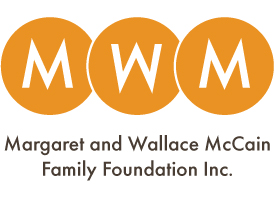
Presented by the Honourable Margaret McCain, in Fredericton, New Brunswick, April 24, 2017

"I desire a better Canada - a country where all citizens, regardless of age, gender, religion, socioeconomic status or sexual orientation have the opportunity to follow their dreams and contribute to their full potential.
I want to begin with a story. In the middle of the past century, a young man from rural New Brunswick invited a young woman from rural Nova Scotia for a 10-cent cup of coffee. This led to more dates where they shared their hopes for the future. His dream was to start a business of his own. The following year they married and soon thereafter returned to his home community where along with his brother and they launched a business from the product of the land – the lowly potato. They built what is now a multinational frozen French fry corporation and all they knew about French fries was that they tasted good. That young man was my husband.
Canada is a country where such dreams can become reality with hard work, energy, commitment and perseverance. Our country values and nurtures these characteristics. We place high importance on humanity with a low tolerance for corruption. We have a high expectancy for truth and transparency and a low tolerance for racism and discrimination. We respect and welcome different cultures and faiths; we reject bigotry, misogyny and hatred.
My friend, Dr. Ann Sherman, Dean of Education at the University of New Brunswick, had a doctoral student from Bhutan. During her time at the university this student lived in Fredericton with her two young sons. During the Xmas season they heard a lot about the birth of Jesus and his life. One day, the seven year old commented to Ann that this Jesus guy was a lot like Buddha. Ann agreed, adding that they both believed in a peaceful and loving world. In Canada Jesus and Buddha can be good neighbours.
In 2016, the World Economic Forum released its first list of the world’s top 20 countries. Canada ranks #2 behind Germany. For quality of life we rank #1. The stability of our political system; our access to clean air and water and our comprehensive education and health services contribute to our top spot.
A #2 ranking is excellent - a very good place to be and we can be proud of it.
But before we begin cheering let’s take a closer look at the red flags flapping -- income inequality, child poverty and the gender wage gap.
- 42 percent of Canadians are functionally illiterate. Across Canada a high percentage of high school students graduate with a general certificate – translated this means they are NOT sufficiently literate or numerate for today’s knowledge based economy and highly technical world. They cannot process written information, operate a highly technical piece of industrial equipment or a high tech car of truck.
- 4 million Canadians live with food insecurity – hunger. That is more than 10 percent of our population. Is this acceptable?
- One in five Canadians suffer from mental illness.
- Unemployment is 6.9 percent – youth unemployment 13.2 percent. How much of this is due to lack of job skills?
- We are not even close to meeting world standards in greenhouse gas emissions.
- Our record with indigenous peoples is shameful. Intergenerational trauma of enforced residential schools is perpetuated by the continued underfunding of health, education and social services at half the rate of other Canadians.
We do have serious problems confronting us and the response must be both national and international.
In this century, there will be 9 billion human beings on the planet. These numbers will change how we live and organize ourselves; influence socioeconomic initiatives and infrastructures; and test the limits of the environment. Canada will not be immune to clashes over access to fresh water and food supplies.
Yet humans have a distinct capability to innovate, create technologies and find solutions to complex problems. Our task today, indeed even our very survival as a species, is to close the gap between rich and poor and ensure that future generations have the capacity to create democratic, pluralistic and sustainable societies.
Our ability to innovate is challenged by inequality but we know how to intervene, and there are many good examples of effective interventions. The most effective interventions take place early in life between conception and age 5 – during the first 2000 days– when the foundations of learning, health and behavior are established.
Integrating care with early education provides equal opportunity for all by addressing family poverty, supporting women’s labour force participation and most importantly prioritizing the needs of the next generation through quality pre-school education for 2, 3 or 4 years.
Canada is well placed to enhance equity of opportunity by building onto public education to create quality, affordable, accessible programs with constancy of curriculum and staffed by well-supported professionals.
Building education down makes sense. Among our Anglo-American counterparts, Canada has the highest enrolment in publicly-funded education. Parent confidence is well founded. Our public schools have produced our premiers and prime ministers, Supreme Court judges, recipients of the Order of Canada and cultural and scientific icons. Schools have helped prepare children born here and abroad to participate in shaping our democratic institutions. As schools respond to their communities across the life cycle, support for public education, for pluralism, and for democracy grows. Early education -- it is a great equalizer -- with it we all benefit."
- To learn more about the Walrus Talks National Tour


Margaret McCain, philanthropist and chair, Margaret and Wallace McCain Family Foundation Inc.; Aaju Peter, advocate for Inuit rights;
and Jenna Tenn-Yuk, spoken word artist and facilitator and Carol Loughrey, MWMFF Board Member
